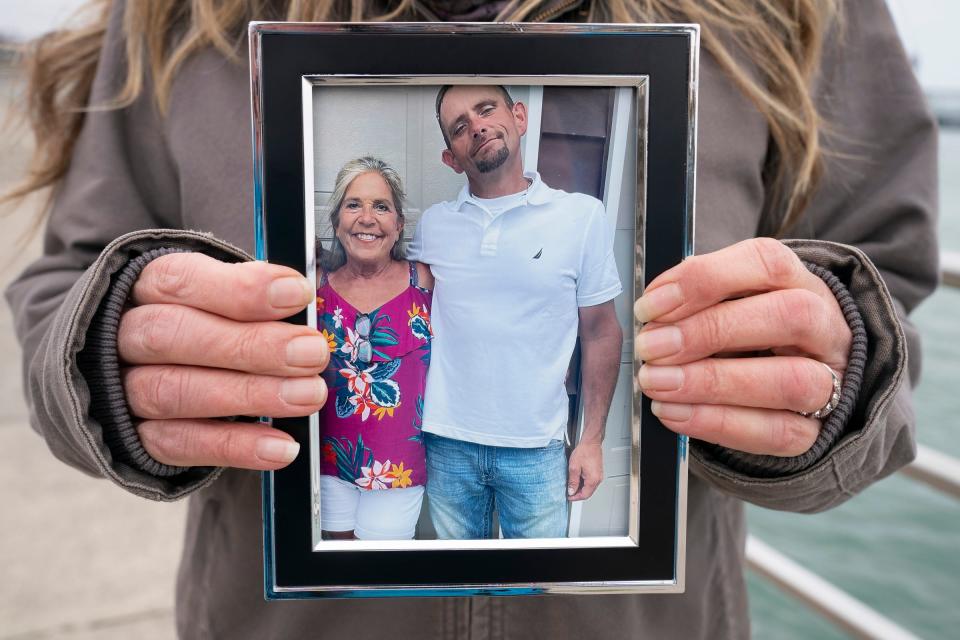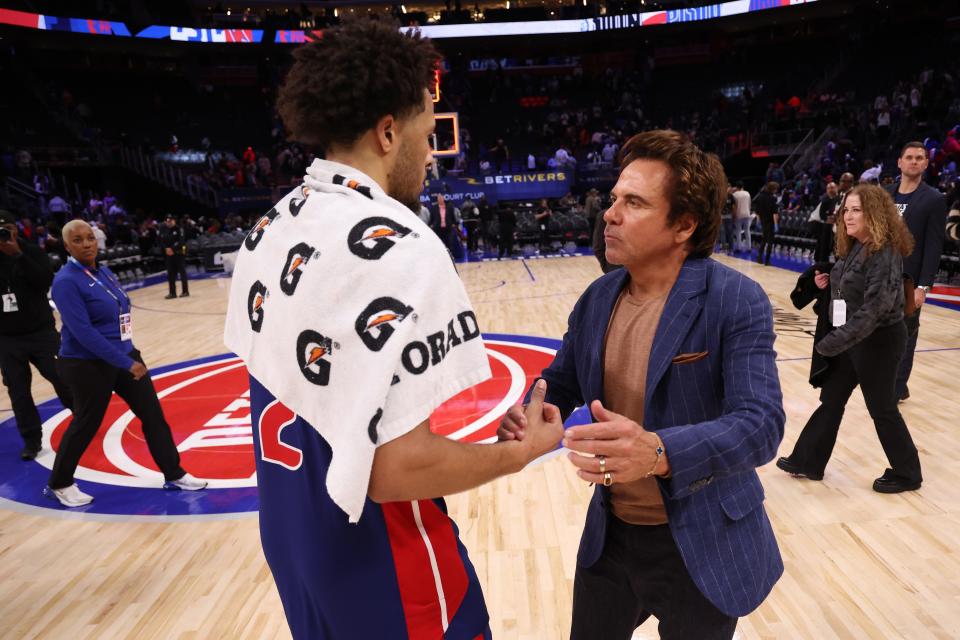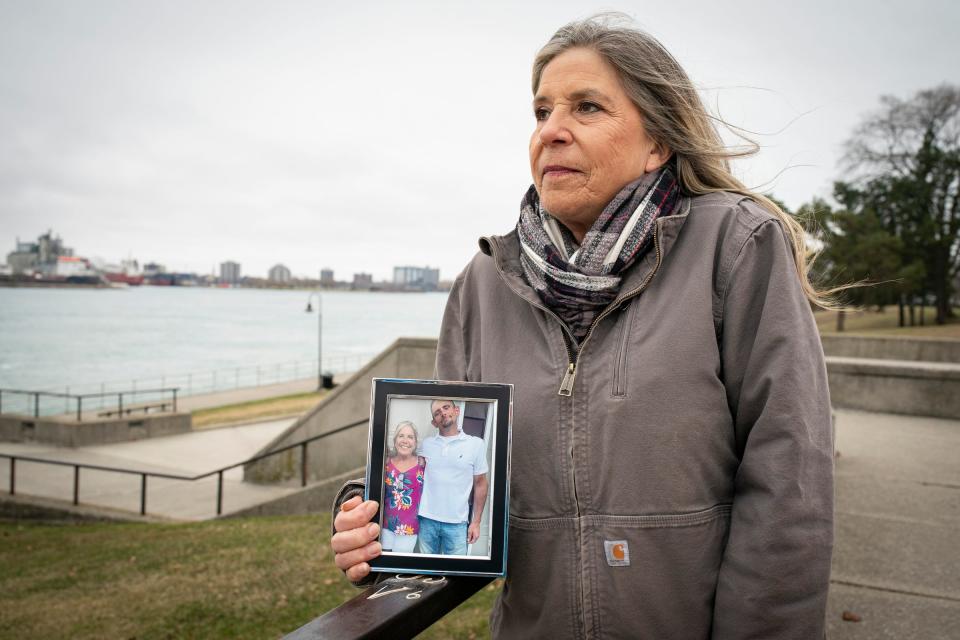Lawsuits: St. Clair, Genesee counties conspire with telecom firms to gouge inmate families
- Oops!Something went wrong.Please try again later.
For about the last five months, Katie Tanton said she's been making weekly treks to the St. Clair County Jail to visit her son.
Each time the Port Huron mother attends her free, previously scheduled 30-minute visit, she says she goes into a small room with video screens with phone receivers to see and to talk with her son on one of kiosks set up to communicate with him via video. At times, she says, visitors are "shoulder to shoulder." The room is loud and everyone can hear everyone else's conversations.
"There's been times where it's like you can't even see him, like the quality is horrible," the 63-year-old said. "You only get to see his face, and I want to see his whole body ... I need to see him. It's just very important to me. I don't want to see him on the TV screen." During one visit, she couldn't see her son, who is in his early 40s. It was just a green screen.

"As a mother, you worry. You're like, OK, why aren't they allowing me to see him? What's wrong? Is something wrong with him? Another time, it was like the screen was melting; like the monitor was melting. You couldn't even see his face. Then it's just horrible because once that 30 minutes is up — there is a timer — you better be right on top to say: 'I love you and I will see you.' If not, it's gone. Just in a flash. He's gone."
Tanton is among a handful of people who filed a lawsuit against the the St. Clair County sheriff, the companies behind the telecommunications system at the lockup and the jail, which allowed family visitation in person until 2017. One of the companies is owned by Tom Gores, the Detroit Pistons owner, who also is named in the St. Clair County suit.
A similar civil lawsuit with more plaintiffs was filed in Genesee County against that county, its sheriff and a different company that runs the telecommunications system there. The Genesee County Jail allowed family visitation with contact until 2014, according to the lawsuit.
The crux of the lawsuits is this: The plaintiffs allege the defendants are conspiring to prohibit in-person family contact as part of a scheme for the counties and the companies to make money, which the plaintiffs claim violates Michigan law.
Plaintiffs' attorney: 'The cases demand urgent action'
Both lawsuits are requesting class-action status for all individuals with a parent or child detained in jails in St. Clair and Genesee counties at any point since March 15, 2021.
The plaintiffs are seeking, among other things, preliminary and permanent injunctions in both counties, blocking them from continuing to enforce the in-person visitation ban, as well as a permanent ban on the companies continuing to conspire to prohibit in-person visits.

They also seek damages to be determined at a jury trial.
The complaints involve different plaintiffs, but all of the plaintiffs are parents or children of people who are or were housed in the two jails. The complaints include their stories as well as information about the importance of in-person contact for the inmates and their loved ones, particularly children, and practices and cost comparisons at other lockups.
"These cases demand urgent action from the courts because children are suffering. Every day these children and parents remain separated adds to their pain. But the cases also pose a broader question: Do we as a public condone a criminal system so unmoored from any moral bearings that it supports the punishment and exploitation of children, families and communities?" asked Cody Cutting, an attorney with Civil Rights Corps in Washington, D.C., one of three law firms, another being Public Justice, representing the plaintiffs in the cases.
"These path-breaking lawsuits remind us that what happens behind the walls of our criminal punishment system never remains there — it affects children, families and the broader public. Ultimately, it says who we are as a society."
Defendants aren't commenting
The St. Clair County lawsuit names the county; Sheriff Mat King; Securus Technologies LLC and Platinum Equity LLC, a private equity firm that purchased Securus, of which Pistons owner Gores is chairman and CEO. The complaint also names Gores as well as Mark Barnhill, a partner at Platinum Equity, and David Abel, president and CEO of Securus and Aventiv Technologies, Securus’ parent company.
The Genesee County lawsuit names the county, Sheriff Christopher Swanson, Global Tel*Link Corp., doing business as ViaPath Technologies, and Deb Alderson, the company’s president and CEO.
Gary Fletcher, corporation counsel for St. Clair County, which represents the sheriff and the jail, said in an email: “I have not seen the lawsuit so it would be impossible to comment.”
A woman who returned a Free Press message for King said in a voicemail: "We're not making a comment at this time."
Jennifer Jackson-Luth, spokesperson for Aventiv Technologies, said in an email: "At this time, we decline comment."
Platinum Equity Spokesperson Dan Whelan said in an email, "We do not comment on pending litigation."
Genesee County Corporation Counsel Brian MacMillan said in an email he had no comment on the lawsuit, which was served on the county Tuesday morning.
Messages also were left for Swanson and ViaPath Technologies.
Some of the lawsuits' allegations
The lawsuits allege jail officials in both counties, at different times, implemented a new policy that prohibited people from visiting relatives detained in the jails, ensuring that parents and children of those in the lockups would no longer be able "to hug their loved one or look into their eyes" for the time they are confined there.
The policies made electronic communications — phone calls, video calls and electronic messaging — the sole way families could talk with their loved ones in the jails, according to the complaints.
They allege the counties' decisions were "part of a quid pro quo kickback scheme" with the companies to charge the families "exorbitant rates to communicate with one another through 'services' such as low-quality phone and video calls." And, the complaints state, county officials agreed to prohibit in-person visits at the jails in exchange for a "substantial cut" of the companies' future revenues.

Genesee County initially made its deal with Securus but switched to Global Tel*Link in 2018 for a better deal, a contract that remains in effect, according to that lawsuit.
The Genesee County complaint states the company, listed as GTL, pays the county $180,000 per year from phone call revenue, plus an annual cash payment called a "technology grant" of $60,000 plus 20% of the cost of every video call. The contract-priced video call, the complaint says, is $10 for 25 minutes. GTL projected the county would receive another $16,000 per year from its cut of the video call revenue alone, the lawsuit states.
"In total, the GTL agreement promises the county that it will receive at least $240,000 in incentive payments each year based on its current policies," according to the Genesee County complaint.
In St. Clair County, that lawsuit alleges, Securus pays the county 50% of the $12.99 price tag for every 20-minute video call and 78% of the 21 cents per minute cost of every phone call. It states the contract promises the county a revenue stream as well as a minimum guaranteed annual payment of $190,000 paid up front. The 21 cents per phone call is the maximum allowed under law, according to the lawsuit.
"Securus paid the county $154,130 in 2017 in phone call commissions. The next year, with the addition of the new guaranteed payment, video call revenue, and the elimination of in-person visitation, that number almost tripled as it climbed to $404,752. Those gains have steadily continued, reaching nearly $500,000 in 2022," the St. Clair County lawsuit alleges.
The benefits of in-person visits
It also states that phone and video call fees for people in the custody of the Michigan Department of Corrections are "less than half of what Defendants charge in the St. Clair County Jail" and that most people in MDOC custody are entitled to receive contact visits, where prisoners and visitors are allowed to kiss and embrace.
"Empirical studies and correctional best practices demonstrate that allowing families the opportunity for in-person connection helps mitigate the tremendous emotional and physical health consequences of child-parent separation, improves safety inside jails, promotes staff retention, improves employment prospects after release, reduces recidivism and saves the government money," the complaints argue. "Motivated by these considerations, many jails across the U.S. permit and encourage in-person visitation with positive results."
The complaints state families are put in an "impossible position" — choosing between paying for "painfully inadequate video or paying for other necessities of life, like food, rent, gas and hygiene products." They state video calls are inaccessible to many because of the cost, required technology or in a format that is meaningless for infants, neurodivergent children and people with various disabilities.
"Many people will not see their loved one's face — even as a frozen or pixelated image on a screen — for months or years until they are released or transferred," the complaints argue.
The complaints allege that when a video call doesn't work for a variety of reasons, whether the call didn't connect or was poor quality, the kiosk malfunctioned or the detained person was not released from their cell on time, the money spent for the call is not refunded.
The lawsuits state that many experts and impacted families say video calling is useful as a supplement for family and friends, especially when someone is incarcerated far from their community. But these complaints allege these two county jails and the companies servicing them have "gone much farther, prohibiting all in-person visits."
What Gores said about the prison call charges
In 2021, the Free Press spoke with Gores about Securus and concerns about the sometimes-high prices prison telecom companies charge to talk with loved ones behind bars, a question criminal justice reform advocates directed at him.

He had described himself and Platinum Equity as "change agents," saying they're looking for places to cut call rates and provide resources to formerly incarcerated people.
"Ultimately, I think this industry really should be led probably not by private folks. I think it probably should be — I'll get killed for saying this — but the nonprofit business, honestly," he said in the Free Press story, adding that he had a responsibility to bring change to an industry that needs it.
In a 2023 transformation overview, Platinum Equity said that under its ownership, Aventiv-Securus has taken action, including memorializing a ban on contracting practices under prior ownership that limited in-person visitation.
The overview states it has reduced call rates 45% to less than 11 cents per minute; renegotiated more than 200 contracts to eliminate outlier rates; cut third-party rates 50%; called for reduction and elimination of site commissions to improve affordability and began offering an agency-paid/taxpayer funded model to all customers among other changes.
The overview states that customers comprise about 3,450 correctional facilities in all 50 states, providing services that impact approximately 1.1 million incarcerated individuals.
"Platinum Equity wholeheartedly supports efforts to reform business practices in the corrections services industry, and we are acting as change agents to make Securus a responsible industry leader in affordability, accessibility, accountability and transparency. Areas of focus include pricing, privacy, data security and other issues that havebeen highlighted by policymakers and advocates for both customers and consumers," it states.
Contact Christina Hall: chall@freepress.com. Follow her on X, formerly Twitter: @challreporter.

Support local journalism. Subscribe to the Free Press.
Submit a letter to the editor at freep.com/letters.
This article originally appeared on Detroit Free Press: Lawsuits: Jails prohibit in-person visits to make money off calls, video visits

